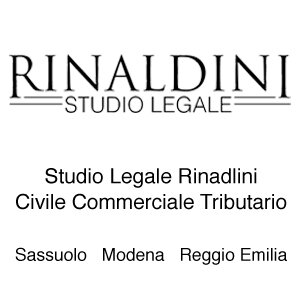Best Corporate Governance Lawyers in Sassuolo
Share your needs with us, get contacted by law firms.
Free. Takes 2 min.
List of the best lawyers in Sassuolo, Italy
About Corporate Governance Law in Sassuolo, Italy
Corporate governance in Sassuolo follows Italian national law and widely accepted corporate practice, adapted to the local business context. Sassuolo is part of the Modena province in Emilia-Romagna, a region known for small and medium sized enterprises, family-owned businesses and manufacturing clusters, especially in ceramics. Governance rules set out how companies are managed and controlled, how power is divided among shareholders, directors and auditors, and how the interests of creditors and other stakeholders are considered. While national law provides the legal framework, local institutions and business culture influence how governance is implemented in practice.
Why You May Need a Lawyer
Corporate governance issues can be routine or high risk. You may need a lawyer in Sassuolo if you are facing any of the following situations:
- Setting up a company or changing the legal form - for example creating an S.r.l. or converting to an S.p.A.
- Drafting or updating the company statute and shareholder agreements, including rules on share transfer, voting rights and exit mechanisms
- Resolving shareholder disputes, deadlocks or minority oppression claims
- Appointing or dismissing directors and statutory auditors, or dealing with alleged breaches of directors duties
- Implementing or reviewing a Modello organizzativo 231 for corporate administrative liability
- Conducting mergers, demergers, acquisitions, divestments or reorganizations
- Complying with corporate disclosure and reporting obligations, including those triggered by public offerings or regulatory oversight
- Handling insolvency, crisis management or workouts under the Italian crisis and insolvency code
In these scenarios a lawyer can protect rights, reduce liability, draft enforceable documents and guide regulatory compliance.
Local Laws Overview
Corporate governance in Sassuolo is governed primarily by national Italian law, applied through local authorities. Key legal sources and concepts you should know are:
- Italian Civil Code, Book V on commercial companies - this sets the basic rules for company types, organ structure, shareholders meetings, directors duties, accounting and dissolution.
- Types of business entities - S.r.l. (limited liability company) and S.p.A. (joint stock company) are the most common forms. S.r.l. is popular for small and medium enterprises due to flexibility, while S.p.A. has stricter governance rules and is typical for larger or listed companies.
- Board structures and oversight - directors are responsible for management; many companies must also have a collegio sindacale or a statutory auditor. The role and liability of these bodies is defined by the Civil Code and implementing regulations.
- Legislative Decree 231/2001 - this sets corporate administrative liability for certain crimes committed in a companys interest. Adopting an effective organizational model - Modello 231 - can reduce corporate liability and is common for risk management.
- Corporate crisis and insolvency rules - the Codice della crisi d'impresa e dell'insolvenza sets preventive restructuring tools, directors obligations on early warning signs and procedures for insolvency management. These rules changed the landscape for governance and director responsibilities.
- Related party and conflict of interest rules - for listed entities there are CONSOB rules; for private firms the Civil Code and case law regulate directors conflicts, majority protection and minority rights.
- Regulatory compliance - data protection under the GDPR and Italian privacy law, health and safety, environmental rules and competition law can all have governance implications for local companies.
- Local administrative landscape - registrations, filings and disputes are processed locally by agencies such as the Registro delle Imprese at the Camera di Commercio di Modena, and litigation is handled in the Tribunale di Modena.
Frequently Asked Questions
What is corporate governance and why does it matter for my company in Sassuolo?
Corporate governance is the system of rules, practices and processes by which a company is directed and controlled. It matters because it defines how decisions are made, how risks and conflicts are managed, how fiduciary duties are enforced, and how the company complies with law. Good governance reduces disputes, improves investor confidence and helps ensure long-term sustainability.
What are the main differences between an S.r.l. and an S.p.A. in Italy?
S.r.l. is tailored to small and medium enterprises and allows contractual flexibility in governance and share transfers. S.p.A. is subject to stricter statutory rules, has publicly transferable shares if listed, and is typically used for larger companies. The choice affects capital requirements, governance bodies, shareholder rights and regulatory obligations.
When should a company in Sassuolo adopt a Modello organizzativo 231?
If the company may be exposed to criminal liability for offences committed in its interest or advantage - for example corruption, fraud or money laundering - adopting a Modello 231 is recommended. The model aims to prevent wrongdoing and can mitigate or exclude corporate liability if effectively implemented and supervised.
What are a directors core duties under Italian law?
Directors must act with due diligence, loyalty and in the companys best interest. Duties include managing the company according to statute and law, avoiding conflicts of interest, keeping proper accounts, and taking timely action if the company is in financial distress. Breach of these duties can lead to liability for damages or criminal consequences in serious cases.
How can minority shareholders protect their rights?
Minority shareholders have statutory protections such as the right to convene meetings under certain conditions, challenge shareholders meeting resolutions, request company information and seek judicial remedies for abuse of majority power. Careful drafting of the company statute and shareholder agreements can add further protections like veto rights, drag-along and tag-along clauses.
Do I need to register corporate decisions with a local authority?
Yes, many corporate acts must be filed with the Registro delle Imprese at the local Camera di Commercio. These include incorporation, changes to the company statute, appointments and resignations of directors, capital increases, mergers and liquidation notices. Timely registration is important to formalize rights and obligations and to comply with legal deadlines.
What happens if a director is suspected of wrongdoing?
If wrongdoing is suspected, the board should assess the facts, possibly appoint independent advisors and, when required, notify authorities. The company may launch an internal investigation and take protective measures. Depending on the outcome, civil claims, administrative sanctions under Decreto Legislativo 231/2001 or criminal prosecutions could follow. Legal advice is crucial from the outset.
How does the Italian crisis and insolvency code affect directors?
The crisis and insolvency code increases directors obligations to monitor the companys financial health and to adopt early warning measures. Failure to act when distress signs appear can lead to personal liability. The framework also offers restructuring tools to preserve value, but these require proper legal and financial planning.
Can corporate disputes be resolved without going to court?
Yes. Many disputes are resolved through negotiation, mediation or arbitration. Shareholder agreements often include dispute resolution clauses that require mediation or arbitration before court action. Alternative dispute resolution can be faster and preserve commercial relationships, but enforceability and suitability should be evaluated with legal counsel.
How do I find a qualified lawyer in Sassuolo for corporate governance matters?
Look for lawyers or firms with experience in corporate law, corporate governance, M&A and regulatory compliance. Check professional qualifications, local reputation and references. Consider commercialisti and notaries for tax and formal matters. An initial consultation will help you assess expertise, approach and fee structure. Local professional orders and the Camera di Commercio di Modena can provide referral information.
Additional Resources
For practical assistance and authoritative information consider the following local and national institutions and professional bodies:
- Registro delle Imprese at the Camera di Commercio di Modena for company filings and certificates
- Tribunale di Modena for corporate litigation and insolvency proceedings
- Ministero dello Sviluppo Economico for national company law information and registration rules
- CONSOB for rules applicable to listed companies and market conduct
- Autorita Garante della Concorrenza e del Mercato for competition and antitrust matters
- Garante per la protezione dei dati personali for data protection guidance and GDPR issues
- Ordine dei Dottori Commercialisti e degli Esperti Contabili di Modena for accounting and tax professionals
- Consiglio Notarile di Modena for notarial services and corporate formalities
- Local trade associations and industry groups in Emilia-Romagna, which can be useful for sector specific guidance and networking
Next Steps
If you need legal assistance with corporate governance in Sassuolo, follow these practical steps:
- Gather key company documents before meeting a lawyer - statute, recent shareholder meeting minutes, financial statements, minutes of board meetings, shareholder agreements and any notices from authorities.
- Prepare a clear summary of the issue - facts, timeline and desired outcome. This saves time and improves the quality of advice.
- Schedule an initial consultation with a lawyer experienced in corporate governance. Ask about relevant experience, approach to similar cases and fee structure - including whether the lawyer offers fixed fees for defined tasks.
- Consider multi-disciplinary advice - commercialisti for tax and accounting issues, notaries for formal acts, and compliance specialists for 231 models and data protection.
- Agree on an engagement letter that sets out scope, fees, timeline and confidentiality. Early agreement on these points helps avoid misunderstandings.
- If urgent action is required, seek immediate legal advice to preserve rights - for example to block wrongful transfers, convene emergency meetings or apply for injunctive relief.
Taking these steps will position you to manage governance risks effectively and secure tailored legal support suited to the local context in Sassuolo.
Lawzana helps you find the best lawyers and law firms in Sassuolo through a curated and pre-screened list of qualified legal professionals. Our platform offers rankings and detailed profiles of attorneys and law firms, allowing you to compare based on practice areas, including Corporate Governance, experience, and client feedback.
Each profile includes a description of the firm's areas of practice, client reviews, team members and partners, year of establishment, spoken languages, office locations, contact information, social media presence, and any published articles or resources. Most firms on our platform speak English and are experienced in both local and international legal matters.
Get a quote from top-rated law firms in Sassuolo, Italy — quickly, securely, and without unnecessary hassle.
Disclaimer:
The information provided on this page is for general informational purposes only and does not constitute legal advice. While we strive to ensure the accuracy and relevance of the content, legal information may change over time, and interpretations of the law can vary. You should always consult with a qualified legal professional for advice specific to your situation.
We disclaim all liability for actions taken or not taken based on the content of this page. If you believe any information is incorrect or outdated, please contact us, and we will review and update it where appropriate.









